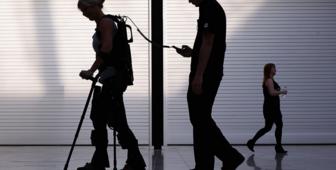Risk of robot uprising wiping out human race to be studied
 In The Terminator, the machines start to turn on the humans
In The Terminator, the machines start to turn on the humans
Cambridge researchers are to assess whether technology could end up destroying human civilisation.
The Centre for the Study of Existential Risk (CSER) will study dangers posed by biotechnology, artificial life, nanotechnology and climate change.
The scientists said that to dismiss concerns of a potential robot uprising would be "dangerous".
Fears that machines may take over have been central to the plot of some of the most popular science fiction films.
Perhaps most famous is Skynet, a rogue computer system depicted in the Terminator films.
Skynet gained self-awareness and fought back after first being developed by the US military.
'Reasonable prediction'But despite being the subject of far-fetched fantasy, researchers said the concept of machines outsmarting us demanded mature attention.
"The seriousness of these risks is difficult to assess, but that in itself seems a cause for concern, given how much is at stake," the researchers wrote on a website set up for the centre.
The CSER project has been co-founded by Cambridge philosophy professor Huw Price, cosmology and astrophysics professor Martin Rees and Skype co-founder Jaan Tallinn.
"It seems a reasonable prediction that some time in this or the next century intelligence will escape from the constraints of biology," Prof Price told the AFP news agency.
"What we're trying to do is to push it forward in the respectable scientific community."
He added that as robots and computers become smarter than humans, we could find ourselves at the mercy of "machines that are not malicious, but machines whose interests don't include us".
Survival of the human race permitting, the centre will launch next year.
~RS~q~RS~~RS~z~RS~21~RS~)


 BBC Radio Times archive digitised
BBC Radio Times archive digitised Morsi calls for Egypt dialogue
Morsi calls for Egypt dialogue 7 days quiz
7 days quiz Peace flight
Peace flight Mars Rover
Mars Rover Policy shift
Policy shift
 Talking Movies
Talking Movies
Comment number 65.
Birchy27th November 2012 - 9:51
True AI is a fiction, we spend years writing 4 million lines of code and then call it AI. It's not AI, it still only does as it programmed to do, if it "adapts" it's because it was programmed to do so..... If an "intelligent" system goes wrong, it's always traceable to an individual mistake, whether thats a programmer or a child sneezing in a component production facility in China.
Link to this (Comment number 65)
Comment number 63.
greenactive27th November 2012 - 9:48
Just like biological evolution, technological advancement is just improving on information structures. Whether it's silicon or carbon based is irrelevant. In that respect the improvements are accelerating at such a pace that it's inevitable really. The event horizon will be when robots can design and replicate themselves.. which isn't far off.
Link to this (Comment number 63)
Comment number 47.
georgianbrit27th November 2012 - 9:23
I can remember first seeing a mobile phone in a film and a automatic sliding door on Star Trek. Films have always been the stage for introducing new technology first. So why not AI robots too. I think they are wise to assess the potential threat, but I think that it will be only information. There are too many people in the world to control the out come, as with so many things. We are snowballing!
Link to this (Comment number 47)
Comment number 38.
stereotonic27th November 2012 - 9:12
I have always thought that technology moves at such a speed, that I often wonder if we can keep up with ourselves. I do believe that we can surpass our own brainpower, and need to be a very careful. Powerful things in the wrong hands could spell big trouble
Link to this (Comment number 38)